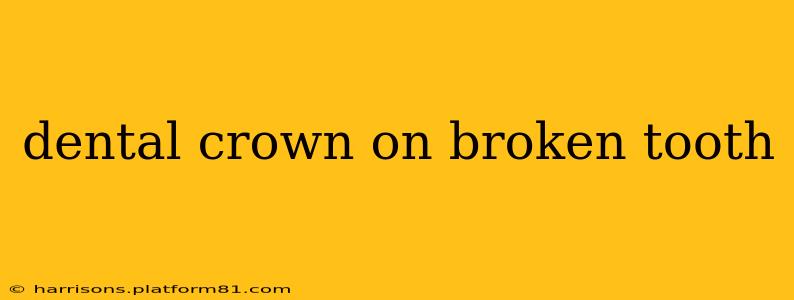A broken tooth can be a painful and distressing experience, significantly impacting your ability to eat, speak, and smile confidently. Fortunately, a dental crown is a highly effective and common solution to restore a broken tooth to its full function and aesthetic appeal. This comprehensive guide will explore everything you need to know about dental crowns for broken teeth, answering common questions and providing valuable insights.
What is a Dental Crown?
A dental crown is a tooth-shaped cap that's placed over a damaged tooth to restore its shape, size, strength, and appearance. Think of it as a "cap" that fits snugly over the remaining tooth structure. Crowns are typically made from durable materials like porcelain, ceramic, metal (gold or alloys), or a combination of these, ensuring long-lasting protection and a natural-looking result.
Why Would I Need a Crown for a Broken Tooth?
A dental crown is often the preferred treatment for significantly damaged teeth. Several scenarios necessitate a crown:
- Large cavities: When a cavity is too extensive to be repaired with a simple filling, a crown provides the necessary support and protection to prevent further damage.
- Cracked or fractured teeth: A crown reinforces weakened tooth structure, preventing further fracturing and potential tooth loss.
- Teeth weakened by root canals: After a root canal, a tooth becomes more brittle. A crown provides the strength and stability needed to prevent breakage.
- Cosmetic improvements: Crowns can improve the shape, color, and size of a damaged tooth, enhancing the overall appearance of your smile.
What Happens During the Dental Crown Procedure?
The process typically involves several appointments:
- Preparation: The dentist will carefully prepare the broken tooth by removing a layer of enamel to create space for the crown.
- Impression: An impression of the prepared tooth is taken to create a custom-fitting crown in a dental laboratory.
- Temporary Crown: A temporary crown is placed to protect the prepared tooth until the permanent crown is ready.
- Permanent Crown Placement: Once the permanent crown is received from the lab, the dentist will carefully cement it into place.
How Long Does a Dental Crown Last?
With proper oral hygiene and regular dental checkups, a dental crown can last for many years, even decades. However, the lifespan of a crown depends on several factors, including the material used, the patient's oral hygiene habits, and the forces applied to the tooth.
What are the different types of dental crowns?
Dental crowns come in various materials, each with its advantages and disadvantages:
- Porcelain: Highly aesthetic, closely mimicking the natural appearance of teeth. However, it can be more brittle than other materials.
- Ceramic: Similar to porcelain in aesthetics and strength, offering a durable and natural-looking option.
- Metal: Extremely durable and strong, often used for back teeth where strength is paramount. However, they may not be as aesthetically pleasing as porcelain or ceramic crowns.
- Porcelain-fused-to-metal: Combines the strength of metal with the aesthetic appeal of porcelain, offering a good balance of durability and appearance.
How much does a dental crown cost?
The cost of a dental crown varies depending on several factors, including the material used, the dentist's fees, and your insurance coverage. It's best to contact your dentist for an accurate cost estimate.
Do dental crowns hurt?
The process of preparing the tooth for a crown may involve some discomfort, but most dentists use local anesthesia to numb the area, making the procedure relatively painless. You might experience some mild sensitivity after the procedure, but this usually subsides quickly.
What are the risks and complications associated with dental crowns?
While generally safe and effective, there are potential risks associated with dental crown procedures, including:
- Gum irritation: Improperly fitted crowns can irritate the gums.
- Crown fracture: Although durable, crowns can fracture under extreme force.
- Allergic reactions: Allergic reactions to certain crown materials are possible, although rare.
- Tooth decay: Poor oral hygiene can lead to decay around the edges of the crown.
By carefully following your dentist's instructions and maintaining excellent oral hygiene, you can significantly reduce these risks and ensure the long-term success of your dental crown. Regular dental checkups are crucial for monitoring the health of your crown and addressing any potential problems promptly. A dental crown is a valuable investment in your oral health and can significantly improve your quality of life by restoring the function and aesthetics of your smile.
